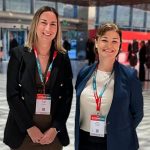Kate’s diagnosis story
Kate experienced the symptoms that led to her MS diagnosis in July 2005 while travelling with her family in the UK.
“I had woken up one morning with incredible vertigo and nausea…The feeling persisted for a few days, and I consulted a local GP who diagnosed me with vestibular neuronitis [an inner ear disorder that affects balance and can cause vertigo and nausea].”
Her symptoms subsided and she returned home, seeking answers from a range of specialists over the following months.
In February 2006, she was diagnosed with MS, and she received steroid treatment in the hospital. In hindsight, Kate reflected that her first symptoms manifested in 2002 at 15 with a bout of optic neuritis, an inflammation of the optic nerve that can cause vision loss and eye pain.
Newly diagnosed and a year and a half into her university degree, Kate struggled to manage her MS symptoms.
“I couldn’t sit through a whole lecture because I was so dizzy, I couldn’t drive, I couldn’t work, I couldn’t walk for long periods, let alone play sports…I still lived at home with my parents, and there was no prospect of moving out with my symptoms as they were.”
Despite her difficulties navigating her MS early on, Kate sought support from her university to manage her symptoms and continue her studies. She engaged with specialists and worked towards managing her symptoms, adjusting to her new normal.
“The world opened up to me one day at a time. I finished my degree, got a full-time job, and married my wonderful husband. It took me years to get to where I am now, but these days, I lead what I consider a mostly normal life.”
Daily life and living with MS
Since graduating from university, Kate started her career in IT. After 14 years of full-time work, she recently began to work four days a week, allowing an extra day to manage health appointments and advocacy work.
Kate’s position as an IT consultant is fully work from home, a change that she describes as a ‘revolution’ for her fatigue management. She approaches daily tasks with a detail-oriented approach, keeping calendars, taking notes on tasks and regularly updating to-do lists to keep on top of both life-admin and work.
“At work, it means I’ve always got an overview of where I’m at with projects and a full history of meetings to refer back to, and personally, it means I have a record of important topics and decisions discussed with my healthcare team as well as any outcomes I need to follow up.”
With the assistance of MS Queensland, Kate co-founded the Townsville-based Young and Working People Living Positively with MS support group in 2014. Over its 11-year life, the group has offered information, peer support and coffee catch-ups to over 40 people in the region, and Kate has been so grateful to benefit from the group’s collective wisdom, resilience and humour.
To remain active, Kate has been doing yoga for 10 years and says exercise is a great way to manage her fatigue, especially when she’s experiencing an exacerbation of her MS symptoms.
“It can be incredibly hard sometimes to push myself to do exercise when I’m feeling very fatigued, but I know that once I’ve done a couple of sessions – whether they be structured gym sessions or just going for a walk for a few minutes – I can start to break out of that cycle.”
Overall, she attributes her health to having a strong medical and allied health support team, an effective medication regimen, and a good daily routine. As an active member of the Townsville community, she sometimes struggles to balance self-care and wanting to engage with those around her, so she prioritises fatigue management strategies to help her rest when she needs it.
Kate recently shared her enjoyment of exercise in MS Australia’s ‘Living Well with MS‘ guide. She shared the fulfilment she finds in regular exercise and its benefits for managing her fatigue.
Women in STEM
A self-described ‘nerd’, Kate was drawn to work in computing from a young age. Working and studying in a male-dominated industry, she is passionate about increasing the representation of women in STEM through mentorship and networking.
“It can be incredibly intimidating being the only woman in the room at the start of your career, and the imposter syndrome IS real, but over my 15-plus years in the industry, I’ve learnt to better trust my skills and instincts, established great working relationships with many colleagues and also found wonderful support from women-focused IT community groups.”
Being part of the LEEP
Kate joined the LEEP when it was first established and is an active and engaged member, bringing a range of lived experience to the panel. This includes offering insights into being diagnosed and living with MS from a young age, accessing care in a regional area and balancing professional responsibilities with disease management.
“It has been amazing to be surrounded by a group of such passionate MS advocates with remarkable experiences as well as inspiring visions for the future.”
Her work with the LEEP has included providing lived experience input and feedback to MS Australia’s policy submissions, resources, news articles and publications. She has also participated in research projects, including providing feedback on research design and other research initiatives, and will be joining as a member of the Australian MS Longitudinal Study (AMSLS) steering committee.
“Seeing how closely MS Australia is involving the LEEP in many aspects of design, strategy, and research makes me very optimistic for the future care and empowerment of people living with MS in Australia.”
Support and U-turns
Kate’s journey since diagnosis has been supported and enriched by amazing health professionals, inspirational members of the MS community, and a wonderful group of family, friends and colleagues.
“I believe strongly in having a trusted health team around you so that you can feel supported to ask questions and learn about your own situation, as well as advocating for your needs when it’s necessary. It’s also really important to have family, social and work supports who share the vision you have for your life, encourage your endeavours and help you to build resilience along that path.”
Kate’s hope for the future is that young people will see there is an exciting and fulfilling life to be had beyond their MS diagnosis.
“As much as it may not feel like it when you start your MS journey, there are so many things that you can do and be and create. This is not the end of your story, it’s a diversion, maybe a couple of U-turns, but your interests and passions are still the same. With a few adjustments, the things you dreamed of are still within your reach, even if it takes a little longer or the outcome looks a little different to what you’d expected.”




